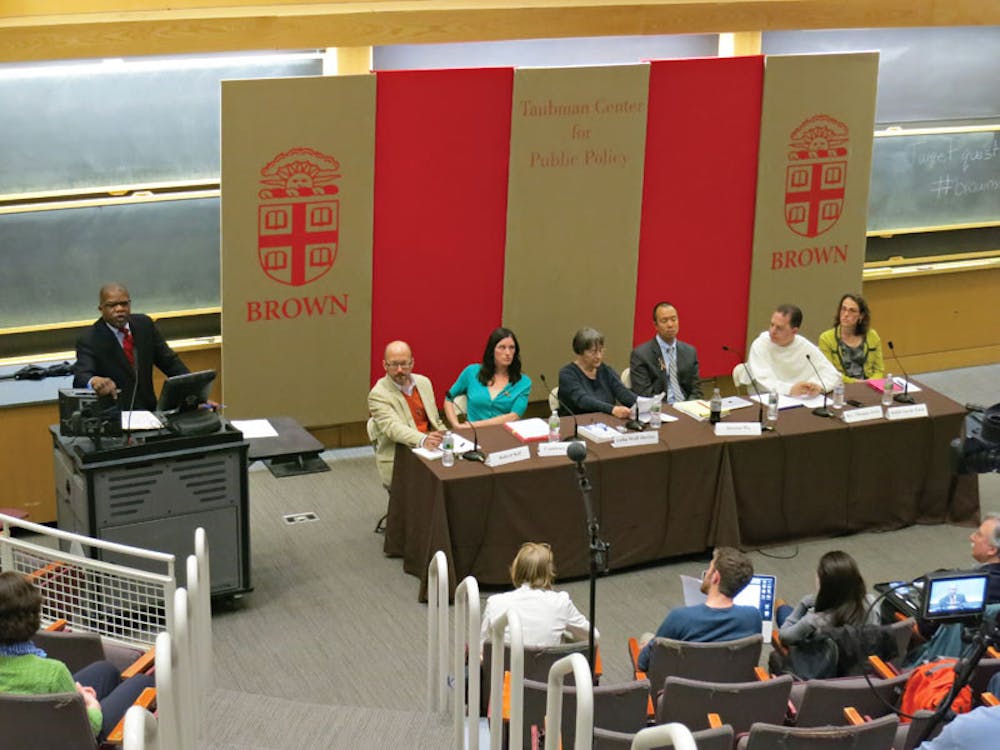Academic experts and religious leaders debated the legalization of same-sex marriage at a heated forum sponsored by The Herald and the Taubman Center for Public Policy and American Institutions Tuesday.
Speakers from both the pro- and anti-same-sex marriage perspectives shared the stage with scholars in history and law to discuss their views the same day a bill legalizing same-sex marriage was passed by the Rhode Island Senate Judiciary Committee. The bill — which faces a vote in the full Senate today — will be sent to Gov. Lincoln Chafee ’75 P’14 if it clears today’s vote. Chafee has previously indicated he will sign the legislation if it reaches his desk.
Thomas Petri, Catholic priest and a friar in the Order of the Preachers who spoke on behalf of Bishop Thomas Tobin, the head of the Catholic Diocese of Providence, and Celia Wolf-Devine, a writer who previously taught at Stonehill College, argued against same-sex marriage by asserting it is contrary to the societal mission of marriage, which they linked to producing good citizens through childbearing.
Janson Wu, a staff attorney with Gay and Lesbian Advocates and Defenders, and Associate Rabbi Sarah Mack of Temple Beth-El in Providence both spoke in favor of same-sex marriage. Courtney Cahill, a constitutional law professor at Florida State University, and Professor of History Robert Self delivered commentary on the historical and legal dimensions of the same-sex marriage debate and gay rights movement. The forum was held in MacMillan 117 and attended by about 100 people.
“If marriage is an emotional union — a solid commitment of love — I will go on the record in favor of gay marriage,” Petri said. “But equating marriage and love is a relatively recent idea.”
Wolf-Devine cited examples of children who claimed to have suffered as a result of having same-sex parents. “This is not a matter of judging individuals,” she said. “Basic heterosexual relationships are best for the children.”
Both Petri and Wolf-Devine were met with criticism from the other panelists and audience members.
Aidan Dunbar ’16 introduced himself as a son of two lesbian parents during the question-and-answer session. He said the panelists opposed to same-sex marriage seemed to imply his family background had “harmed or disadvantaged” him.
“I had an incredible childhood, but this was because I was lucky enough to have parents that loved me,” he told the panel.
Mack offered a defense of same-sex marriage on behalf of “religious liberals,” adding that she feels limited in her ability to allow Jewish couples “to sanctify their relationships” because Rhode Island does not permit same-sex marriages.
Wu, who was involved in the 2010 debate to legalize same-sex marriage in New Hampshire and has testified in the Rhode Island Senate hearings on the current legislation, said the lack of legal recognition for same-sex marriages has a detrimental effect on families. “What’s important is that real families are being hurt by the law as it is today,” Wu said. “The LBGTQ community has faced much discrimination.”
Cahill laid out the constitutional background for the same-sex marriage debate, citing a line from the U.S. Supreme Court case Lawrence v. Texas that bolstered gay rights, as well as current cases over the constitutionality of the Defense of Marriage Act and California’s ban on same-sex marriage.
Though Petri said he is not aware of any sociological studies that show children of homosexual parents are worse off than children of heterosexual parents, he added that research does show children raised by single parents or step-parents fare worse than children who grow up with a mother and a father.
Some students reacted strongly to the panel’s inclusion of same-sex marriage opponents, whom they accused of using hateful rhetoric.
More than a dozen protesters attended to oppose the invitation of Christopher Plante, the regional director for the National Organization for Marriage. But Director of the Taubman Center Marion Orr announced in his introductory remarks that Plante could not attend and that Wolf-Devine replaced him on the panel.
The protestors carried signs with slogans like “Hate is not debate” and wore strips of gray tape over their mouths to reflect what they called the silencing of their voices. During the question-and-answer session, several students denounced some of the speakers, with one criticizing the event as a whole and saying she had never been more disappointed in Brown.
The historical context of marriage lies at the center of the debate, Self said. “Amidst the many changes in the definition of marriage over the decades, it stands as one of the principal institutions through which states regulate legal obligations,” he said, adding that marriage has been the most powerful institution for earning respectability in American life.

ADVERTISEMENT




